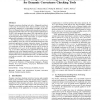Free Online Productivity Tools
i2Speak
i2Symbol
i2OCR
iTex2Img
iWeb2Print
iWeb2Shot
i2Type
iPdf2Split
iPdf2Merge
i2Bopomofo
i2Arabic
i2Style
i2Image
i2PDF
iLatex2Rtf
Sci2ools
112
click to vote
PLDI
2010
ACM
2010
ACM
Decoupled lifeguards: enabling path optimizations for dynamic correctness checking tools
Dynamic correctness checking tools (a.k.a. lifeguards) can detect a wide array of correctness issues, such as memory, security, and concurrency misbehavior, in unmodified executables at run time. However, lifeguards that are implemented using dynamic binary instrumentation (DBI) often slow down the monitored application by 10–50X, while proposals that replace DBI with hardware still see 3–8X slowdowns. The remaining overhead is the cost of performing the lifeguard analysis itself. In this paper, we explore compiler optimization techniques to reduce this overhead. The lifeguard software is typically structured as a set of eventdriven handlers, where the events are individual instructions in the monitored application’s dynamic instruction stream. We propose to decouple the lifeguard checking code from the application that it is monitoring so that the lifeguard analysis can be invoked at the granularity of hot paths in the monitored application. In this way, we are able to find m...
| Added | 10 Jul 2010 |
| Updated | 10 Jul 2010 |
| Type | Conference |
| Year | 2010 |
| Where | PLDI |
| Authors | Olatunji Ruwase, Shimin Chen, Phillip B. Gibbons, Todd C. Mowry |
Comments (0)

